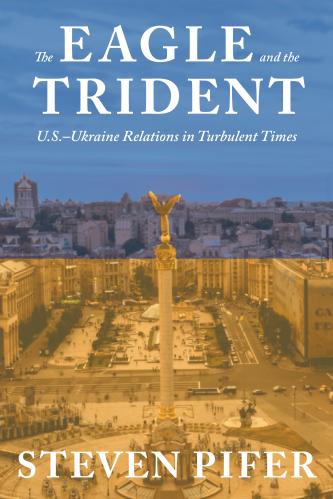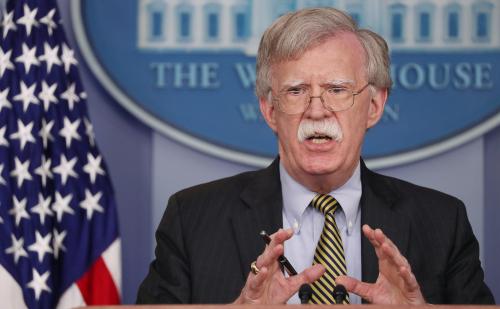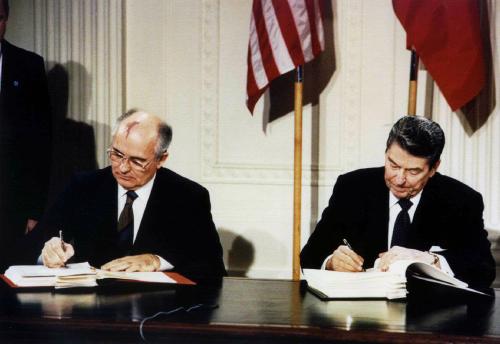The president’s decision on the INF Treaty is a mistake, writes Steven Pifer. Will he make an even bigger error by withdrawing from — or not extending — the 2010 New Strategic Arms Reduction Treaty? This piece was originally published by the Freeman Spogli Institute at Stanford.
President Donald Trump has announced that the United States will withdraw from the 1987 Intermediate-range Nuclear Forces Treaty. His National Security Advisor, John Bolton, discussed that with Russian officials in Moscow earlier this week.
The president’s decision is a mistake. Will he make an even bigger error by withdrawing from — or not extending — the 2010 New Strategic Arms Reduction Treaty?
To be sure, Trump had grounds for abandoning the INF Treaty. Moscow violated the agreement by deploying a prohibited intermediate-range cruise missile. The Russians have resisted U.S. entreaties since 2013 to come back into compliance.
The president’s decision now, however, ensures the United States gets the blame for the treaty’s demise. It has already provoked criticism from NATO allies. Withdrawal will leave Russia free to deploy land-based intermediate-range missiles to target Europe and Asia, missiles for which the U.S. military currently has no counterpart. Trump’s announcement undoubtedly prompted cheers in the Kremlin and Russian Ministry of Defense.
Once the INF Treaty lapses, only one agreement will remain to constrain U.S. and Russian nuclear forces: the 2010 New Strategic Arms Reduction Treaty.
New START limits the United States and Russia each to no more than 1,550 deployed strategic warheads and no more than 700 deployed strategic missiles and bombers. Its provisions for data exchanges, notifications and inspections yield a huge amount of information on Russian strategic forces
New START is in the U.S. interest. It nonetheless has several strikes against it.
First, it was signed by Barack Obama. We know how Trump feels about anything his predecessor did. In January 2017, he dismissed New START as a bad Obama deal in his first Oval Office phone conversation with Vladimir Putin.
Second, Trump enjoys tearing up agreements. The INF Treaty will join the Trans-Pacific Partnership, Paris Climate Accord, Joint Comprehensive Plan of Action with Iran and others in the growing list of international pacts trashed by his administration.
Third, Bolton disdains arms control. He opposed New START, in part because the treaty entailed equal limits for the United States and Russia.
Unlike the INF Treaty, however, Russia has complied with New START’s limits. The U.S. military very much approves of the treaty. A decision to withdraw would provoke a political firestorm, including from Republican ranks.
The more relevant question thus may be: Will Trump let New START lapse when its term expires in 2021, or will he agree with Putin to extend the treaty for five years? The treaty allows for the latter, and the Russians have indicated interest.
Unfortunately, Bolton has alternative ideas. One would return to the 2002 “Treaty of Moscow” model, which limited deployed warheads but not missiles and bombers. Putin was desperate for a treaty in 2002. That’s not the case today. The Russians would not accept an agreement that left missiles and bombers unconstrained, especially when the United States has a numerical advantage.
Bolton also suggested renegotiating New START. That would open the path to new Russian demands. Any agreement would need years to negotiate, if possible at all.
Extending New START offers the logical step. Doing so would continue to 2026 New START’s limits on the number of Russian strategic weapons, at a time when Russia has hot production lines churning out new strategic arms. Extension would not crimp U.S. plans. The Pentagon designed its strategic modernization programs to fit within New START’s limits.
Extending New START should be a no-brainer.
Extension would also continue the flow of information and transparency that the two countries obtain from the treaty’s verification measures. The cost of getting that information through other means, such as photoreconnaissance satellites, would run into the tens of billions of dollars.
New START extension would provide an important measure of stability to the troubled U.S.-Russia relationship. Politically, it would give a boost to bilateral relations.
Extending New START should be a no-brainer, and the sooner, the better.
Secretary of Defense James Mattis and Chairman of the Joint Chiefs of Staff Joseph Dunford should press the extension case with Trump. They are the ones who otherwise will have to develop plans to deal with an unconstrained nuclear arms competition with Russia as well as the costs of replacing New START’s verification measures.
Judging from personalities in the White House, they could face an uphill battle. But it’s one they need to win to save Trump from a blunder that would further diminish U.S. national security.
The Brookings Institution is committed to quality, independence, and impact.
We are supported by a diverse array of funders. In line with our values and policies, each Brookings publication represents the sole views of its author(s).








Commentary
After INF, is New START next to go?
October 29, 2018